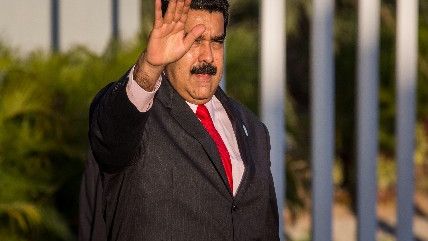Venezuela's Nightmare Government Will Not Get a Recall Vote This Year
Maduro-aligned election board delays referendum until 2017, virtually guaranteeing socialist rule until 2019.


Venezuela's National Election Council has rejected opposition calls for a referendum on President Nicolas Maduro to be held this year, which virtually guarantees that Maduro's Socialist Party will remain in power through the end of 2018.
Had the recall vote been held in 2016, a new presidential vote would have to be held—one that the Socialists would likely lose, particularly after being trounced in the 2015 National Assembly elections. But by delaying a possible vote (contingent on the opposition collecting enough to represent about 20 percent of the voting populace) until 2017, even if Maduro were recalled, his Socialist vice president would succeed him, leaving the unpopular party which has presided over the country since 1999 in power for the remainder of Maduro's term.
Opposition leaders claim the election council is aligned with Maduro and is denying the will of the 80 percent of Venezuelans who want the Socialists out of office. Earlier this month, hundreds of thousands (some estimates went as high as 1 million) of demonstrators took to the streets of Caracas to demand a referendum. In the days leading up to those protests, Venezuelan government authorities arrested a number of protest organizers, including 2008 Cato Institute Milton Friedman Prize winner Yon Goicoechea—a longtime advocate of peaceful protest whom the government accused of being in possession of explosives.
Maduro—who has been president since the death of Hugo Chavez in 2013–has presided over an economy that only three years ago was described by leftist Western journalists as an "economic miracle," but which has since completely collapsed. Under Socialist rule, the oil-rich country has spent tens of millions on propaganda movies which never get made and race car drivers who never win races, while hospitals go without electricity, food and basic household items are scarce, and the rule of law has essentially collapsed—evidenced by widespread looting and lynchings of petty thieves.
The government's response to such crises has been to ban the dissemination of video footage of the violence, and to outlaw lines outside bakeries, which it believes is a "strategy of generating anxiety" perpetuated by the opposition and their imperialist puppet-masters in the U.S.
And what socialist "economic miracle" would be complete without forced labor, which Maduro's government has also decreed can be forced on citizens for up to 60 days, "if circumstances merit."
A massive protest today by bus drivers demanding "better pay, more security against violent crime and spare parts for their buses," has choked traffic to a halt in Caracas, according to Al-Jazeera.


Show Comments (57)